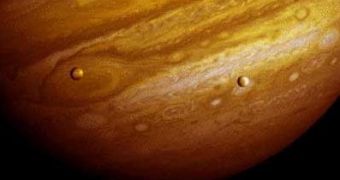Jupiter's natural satellite Europa, is the only cosmic body in the solar system that might have an ocean of liquid water under its frozen surface, except for Earth. This represents a great opportunity for astrobiologists who believe that in the ocean life might be present, as diverse as in the oceans on Earth. However, there is a big problem: though it represents the biggest chance for finding life on another body, except for planet Earth, Europa has been mostly ignored lately, even if there where big expectations of an unmanned vehicle on its surface to study its potential for harboring life.
Europa is one of Jupiter's many moons and right since it was discovered it fascinated many people through its appearance. Deep grooves on its surface seemed to look like artificial structures built by an intelligent life form. Even though space probes studying the outermost planets of the solar system showed that this was not the case, people remained confident that Europa is the best chance for finding life, as it seemed to be covered with a thick layer of water ice.
The deep fissures in its solid icy surface further proved that under the solid surface there might be liquid water that emerges from under it, as Jupiter's gravitational field produces powerful gravitational tides, stretching and crushing it. In the last years the scientific community grew even more confident that Europa has a liquid ocean of water lying under its surface, thus its exploration is imperative.
Recently, William McKinnon, professor of Earth and Planetary Science at Washington University, has initiated a discussion on methods to characterize the potential ocean of water, through gravity and magnetic measurements, in order to determine the thickness of the solid surface layer as it flexes and bends under the influence of the gravitational tides.
Furthermore, one of the biggest problems with the appearance and evolution of life on another planet or moon is posed by deadly levels of radiation that hit their surface. Nevertheless, Europa surprises scientists again by showing that radiation levels on its surface are more than two thirds lower than previous models predicted and the ocean below could have even lower levels of radiation, as regular water is generally a great medium to absorb most types of radioactive emissions.
Data extracted from the Galileo spacecraft revealed that Europa presents signs of carbon dioxide as well, a substance essential to life, which probably originates from beneath its solid crust. Nevertheless, until a future mission to the mysterious natural satellite, scientists still have a lot to learn from previous and current missions to the other planets by making analogies to our own, in order to design an effective probe that will be able to break the thickness of the icy layer which is so far only speculation and hopefully detect the presence of liquid water circulating through the ice, as well as study the biochemistry of a large water body.
Until then measurements are only limited to gravitational and magnetic fields and the composition of the surface layers during liquid water eruptions.

 14 DAY TRIAL //
14 DAY TRIAL //